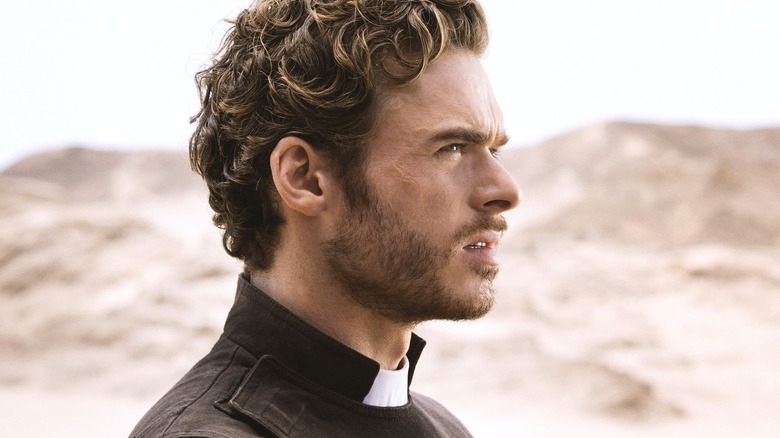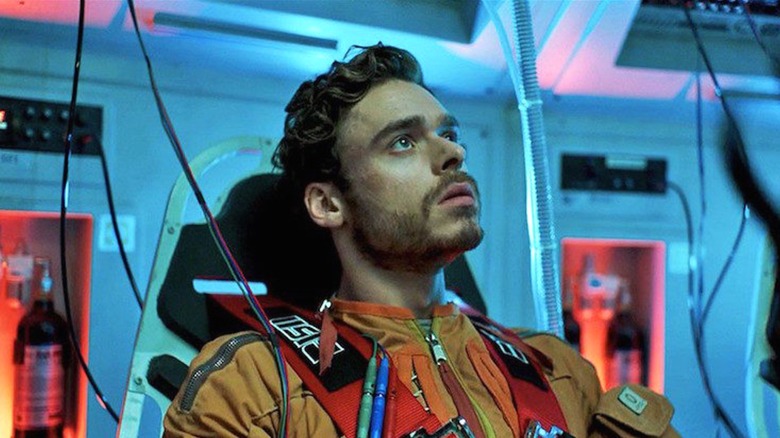The Canceled Prime Video Series That Could Have Become A Sci-Fi Classic
Stories set in space are a dime a dozen. Some space sagas dwell on unknowable mysteries (which are best left unexplored), while others take a more personal approach, presenting the discomfiting opportunity to look deeper within. Many of these stories also emphasize human perseverance (like "The Martian," a tale where humanity overcomes impossible odds), underlining our collective triumph over what's out there.
But Stanisław Lem's sci-fi novel "Solaris" (which spawned both a George Clooney-led Hollywood adaptation and an Andrei Tarkovsky classic) doesn't have much hope for humanity. It explores the futility of communicating with extraterrestrial life and how utterly misguided such an endeavor would be. In "Solaris," rationality and science can only get you so far, as some truths are not meant to be comprehended by the human mind. So, when scientists arrive at the Solaris Station to continue investigating the titular sentient planet, they are faced with a psychological mirror that nearly breaks their fragile sense of self. Ghosts from the past come back to haunt them, and they're forced to acknowledge their limitations as hopelessly flawed overreachers. Lem argues that humanity is inherently incapable of perceiving what is truly alien, as it's not in our nature to move beyond our limited prejudices and socio-cultural constructs.
These sentiments are echoed in Prime Video's "Oasis," which is based on Michel Faber's 2014 novel "The Book of Strange New Things." This 59-minute pilot premiered in 2017 and was meant to give rise to a full-blown series, but it never happened despite the pilot itself receiving above-average critical reviews and audience ratings. In "Oasis," the human characters are out of their depth after moving to a new space colony; there, they encounter horrors to rival the haunting devastation that the "Solaris" scientists experience in Lem's book. Our protagonist is Peter Leigh (Richard Madden, who, at the time, was fresh off the explosive success of "Game of Thrones"), a chaplain who is sent to this colony without explanation, causing a stir among its already on-edge scientists upon his arrival.
Could this premise have bloomed into a compelling sci-fi series? Let's speculate based on what we know.
Oasis boasts a thought-provoking story that could've been a certified hit
The following contains spoilers for "Oasis."
It's unclear why the prospective "Oasis" series was canceled or whether it would've closely followed what the pilot sets up. It's worth remembering that Amazon's parameters for greenlighting a series have changed over the years, so perhaps "Oasis" simply failed to meet its specific criteria in 2017. Whatever the reason, it's still worth examining the pilot, which brings its fictional world and inhabitants to life with a sense of gritty realism. I suspect anyone who appreciates underrated sci-fi gems like "The Expanse" would've been onboard for a full-blown "Oasis" series, as it promised to approach the concept of a planetary haunting in a taut and unconventional way. After all, how many sci-fi stories have been told from the perspective of a heartbroken priest who realizes that his faith might not hold up on an alien planet utterly divorced from human constructs?
As you might've already guessed, the impetus for the hasty space colonization in "Oasis" lies in the fact that Earth is dying, prompting a desperate extraterrestrial mission on a desert-like exoplanet. Humanity's options are obviously limited here: The colony crew (who have been terrorized by strange events since landing) are skeptical about a chaplain being sent to aid them, but quickly accept whatever help they can get in such dire circumstances. But Peter quickly comes to realize he's just as trapped as the others; his capsule is immediately cut up for use upon his arrival, and promises of his return to Earth start feeling increasingly vague.
Before anybody can ponder the implications of embracing organized religion in the face of such a crisis, horrible events begin to pile up. Unexplained accidents befall crew members as they hallucinate about their families and are led astray further inside the planet's treacherous sand dunes. After a certain point, the crew comes to the conclusion these hallucinations aren't triggered by environmental factors but are conscious attacks by a sentient planet that appears to be rejecting their presence. This is the same psychological mirror that humanity has to contend with in "Solaris," where every person, including Peter, is forced to face their biggest flaws and worst sins without succumbing to the planet's will to destroy them.
Do they succeed? We'll never know. But if "Oasis" was greenlit with Madden as lead (along with the talented international cast featured in the pilot), the series might've had a successful run both on the critical and viewership front, as it contained the right ingredients for a gripping, binge-worthy sci-fi series. The delicious ambiguity presented by the pilot could've been the show's X factor, combined with a compelling story that could've eclipsed the profound complexity of its source material.

